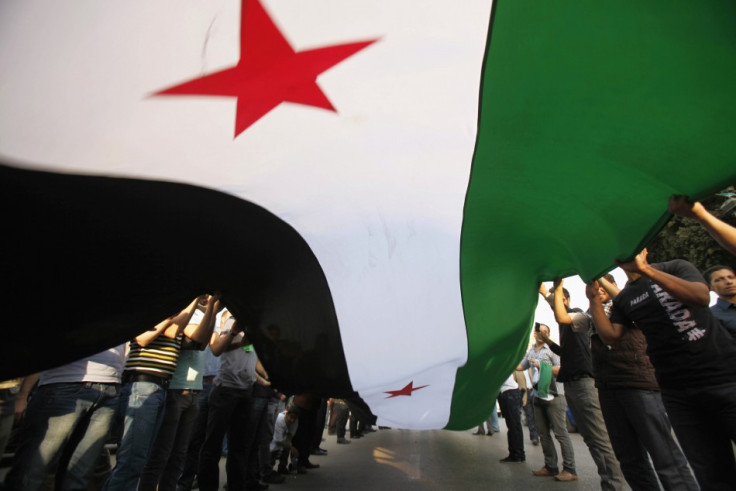Syria: 50 Killed in Latest Clashes

The Associated Press reports that at least 50 Syrians have been killed in the latest surge of violence in the Assad regime's crackdown on protesters. Many of the victims were Syrian soldiers who were attacked by army defectors in the southern province of Daraa on Monday.
The Local Co-ordination Committees opposition group says at least 50 people were killed, while the British-based Syrian Observatory for Human Rights has reported 69 deaths, of which 34 were soldiers.
The LCC earlier posted footage of what appears to be five defecting Syrian soldiers. In the video, the men give their motives for siding with the protesters. One man explains that he defected after being ordered to shoot unarmed civilians during celebrations of the Arab League agreement.
The Arab League announced Saturday that it would be suspending Syria's membership since President Bashar al-Assad had failed to deliver on a deal to end the violence. Foreign Minister Walid al-Moallem accused Arab nations of plotting against Damascus and denounced the move as "shameful and malicious" and a "dangerous step".
In response to the Arab League's plan to suspend its membership, Damascus has called an emergency conference of League members in the Moroccan capital Rabat on Wednesday to appeal the decision.
But the motives for the Arab League's suspension of Syria may not be entirely transparent. The Guardian explains that such a decisive move from "an organisation whose more traditional posture is astride a fence" is "largely symbolic." The leading role in the vote to suspend Syria was made by Qatar - a tiny, oil rich Gulf state whose power and influence possibly surpasses even that of Saudi Arabia. As well as being the home of the Arab world's most successful satellite news channel, Al Jazeera, Qatar has also provided weapons shipments, special forces and planes to the intervention in Libya.
Pressure has been steadily mounting on the Assad regime since protests began eight months ago. King Abdullah of Jordan on Monday called for Assad to step down, saying his imminent resignation would be in "the interest of his country."
The situation on the ground in Syria remains difficult to verify, since the regime has restricted access to foreign media and the only reports within the country come from activists and bloggers, as well as the state-run Syrian news service.
Human rights groups say that more than 3,500 people have been killed in the regime's crackdown on peaceful anti-government protesters since March. Demonstrations and protests have swept the country over the past few months calling for Assad to step down, although there also seems to be a significant faction in the country who remain steadfastly supportive of the Alawite-dominated government. Loyalties in Syria are often split down religious and cultural lines, and there are fears that the country could spiral into sectarian civil war if the current regime falls.
Critics say that if the Syrian National Council, the umbrella group for the Syrian opposition, were to come to power, it would effectively act as Western stooges in a country that has historically remained hostile to U.S. policy.
Assad's defenders have questioned the West's motives for supporting the pro-democracy protests in Syria, suggesting the U.S. using them to bolster Israel and deter Iran, the regime's ally.
© Copyright IBTimes 2024. All rights reserved.





